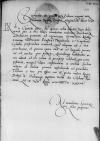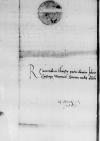Letter #2670
Sigismund I Jagiellon to Ioannes DANTISCUSWielowieś, 1543-10-23
| received Heilsberg (Lidzbark Warmiński), 1543-11-03 Manuscript sources:
| ||||
Text & apparatus & commentaryPlain textText & commentaryText & apparatus
Reverendo in Christo Patri,
Reverende in Christo Pater, domine sincere nobis dilecte.
Non dubitamus, quin S(trenuitas) or S(inceritas)⌈S(trenuitas)S(trenuitas) or S(inceritas)⌉ Tua iuxta mandatum nostrum exactam ex contributione pecuniam ad generosum
Datum in
Ad mandatum sacrae maiestatis regiae proprium


 BCz, 1601, p. 482
BCz, 1601, p. 482